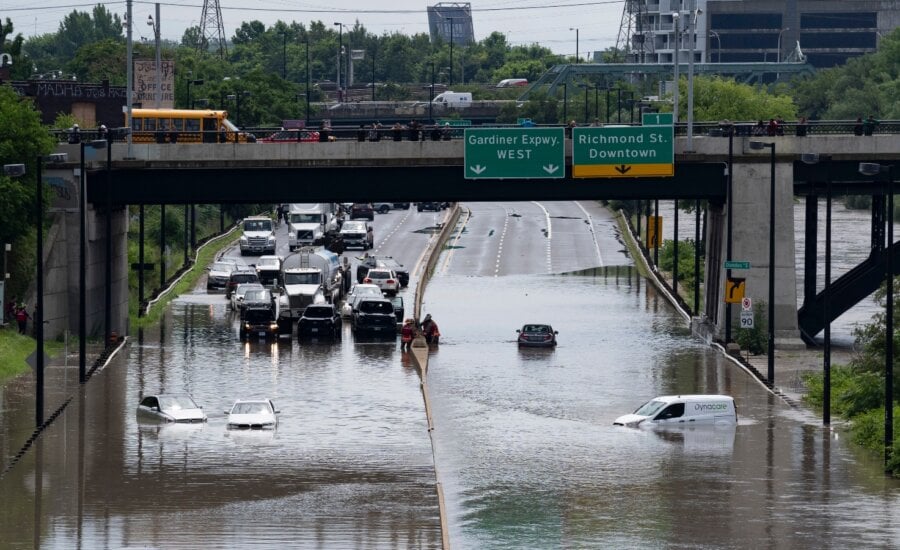What to know about insurance claims after a flash flood
Optional flood insurance is becoming more popular for home owners across Canada. Here’s why.
Advertisement
Optional flood insurance is becoming more popular for home owners across Canada. Here’s why.

Canadian home owners are increasingly adding flood coverage to their insurance policies as extreme weather events become more common, according to the Insurance Bureau of Canada.
And after Tuesday’s intense bout of flash flooding in southern Ontario, some residents may be finding out the hard way that their insurance doesn’t cover flooding—and will be rushing to add that optional coverage to their policy for the future.
“If you live in a flood hazard area or you’ve experienced a flood before, people might be more aware of what their insurance policy may or may not cover, and the options that are available to them,” said Rob de Pruis, national director of consumer and industry relations for the bureau.
“But if you’ve just moved to the area or if you’ve never experienced this before, you may or may not have this coverage.”
Torrential rain hit Toronto and the surrounding area on Tuesday, flooding major highways and a key transit hub amid rainfall warnings for much of southern Ontario.
It’s too early to tell the extent of the damage, said de Pruis, but “we do know that this was a very significant flooding event.”
Many are already comparing Tuesday’s event to a Toronto-area flood in July 2013 that forced almost 80,000 people to evacuate. According to the bureau, the floods resulting from storms in the area caused record levels of rain.
Just a month earlier, catastrophic floods in Calgary forced almost 80,000 people to evacuate and claimed five lives.
The two events combined cost the insurance industry about $3.1 billion in claims, the bureau said.
Optional flood insurance is becoming more popular for home owners across Canada, and more insurers offer it, said de Pruis, as extreme weather events like this week’s flood become more common.
But it hasn’t even been an option for very long. In fact, the two floods in 2013 prompted the industry to start offering overland flood coverage in the first place, said de Pruis.
As extreme weather events become more common, insurers are paying significantly more in claims related to severe weather, whether that’s fire, flood, wind or hail, said de Pruis.
“If we think back about 15 years ago, the insurance industry was paying out on average about $700 million a year for severe weather events,” he said.
In 2022 and 2023, the industry paid out more than $3 billion a year for claims related to extreme weather.
That’s one of the reasons the industry is working with the government to develop a national flood insurance program, de Pruis said, adding that home owners in higher-risk areas might not have access to flood insurance at all, or it might be significantly more expensive.
The program is intended to ensure that all home owners can access affordable flood insurance regardless of their risk, according to the bureau.
When it comes to home insurance, optional overland flood coverage covers specific kinds of damage, such as the kind from overflowing lakes, ponds or rivers, according to the IBC.
Water damage in a basement due to a sewer backup is only covered if you purchased specific optional coverage, the bureau said.
If you have comprehensive auto insurance, you’re likely covered for flooding, de Pruis added.
If there’s a power interruption, the contents of your fridge and freezer may be covered, while in some circumstances, home owners who are unable to stay in their homes because of insured damaged could be entitled to additional living expenses.
Daniel Ivans, an insurance expert with Ratesdotca and a licensed insurance broker, says some Ontarians may not have adequate coverage for their area and their level of risk.
“As weather patterns become more extreme and flooding more severe, many home owners will need to pay close attention their insurance policies to make sure they are covered for what they need,” he said in a statement.
Ratesdotca said recent data on home insurance quotes showed a 68% increase in quotes adding water endorsements in June 2024, compared with the previous year.
De Pruis said improving your home’s flood resilience, such as by installing a sump pump, can make flood insurance cheaper in addition to reducing the costs of damage from future events.
If your home or car was damaged by the flooding, IBC recommends you start by assessing and documenting the damage with detailed notes, and by taking photos, once it’s safe to do so. Assemble any proofs of purchase, warranties and receipts if possible.
Then, call your insurance representative or the company’s claims department to report the damage and to figure out what your coverage includes.
As well, keep receipts for additional living expenses if you’re displaced, said the bureau, and receipts for cleanup at your home.
Share this article Share on Facebook Share on Twitter Share on Linkedin Share on Reddit Share on Email